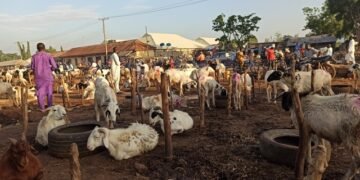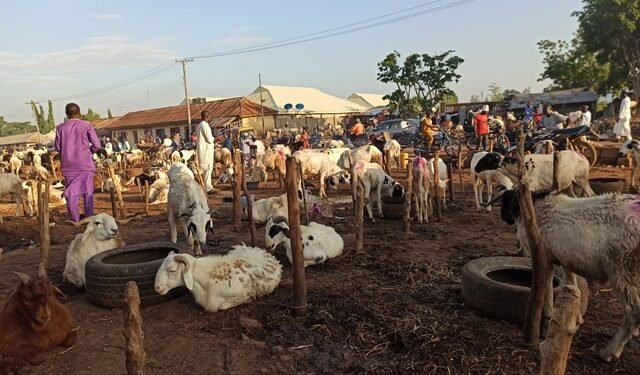Millions of Nigerian Muslims have voiced outrage at the recent elimination of fuel subsidies, which has led to a new rise in food costs and might destroy Id el Kabir for millions of devoted.
They gripe that although tough times have decreased their incomes, rising costs and declining buying power have wrecked havoc on their budgets, forcing many to turn to begging or borrowing to pay their bills.
Many believers are finding it difficult to celebrate as they struggle with high inflation and poor buying power, which have left them without basic necessities.
Afolabi Olaniyan, a young guy who works for a microfinance institution, showed up with N150,000 at the Gbagada Livestock Market in Lagos. Instead of a ram, he left the market with a complaint. He admitted to The Guardian that he had searched more than four cattle markets but had come up empty-handed.
A medium-sized ram costs N250,000 as of yesterday, while the price of a cow, depending on size, goes from N300,000 to N1.3 million.
The consumer price index (CPI)’s food component was 24.6% as of May. The Guardian research shows that several food products have climbed by much more than 50% in the last year. The recent elimination of gasoline subsidies, which boosted commute costs by over 100% in several places, has made the pricing situation worse.
Butchers bemoaned the lack of customer support at the slaughterhouse in Bariga market. Idris Musiliu said that sales were much better last year and connected the difficulty to the difficult economic climate and low customer spending power.
In addition, Musiliu observed that most individuals had already purchased the items they need for the celebration earlier in the month, in preparation for a potential rise in pricing.
“Last year, even travelers came to purchase beef. The marketplace was full. But this time, he added, “it’s different.
Akinola Olorunfemi, a ram vendor at the Olorunfemi Cow Market on LASU Road in Egan, ascribed the rise in the price of cows and rams to the high cost of transportation brought on by the recent elimination of the PMS subsidy.
“Subsidy removal affected the prices of a cow because, previously, a trailer cost $800,000, and the highest price was N1.2 million, but now it costs $1.8 million and N2 million, so we will need to deduct those prices from the livestock,” he added. As a result, ram prices increased.
Olayinka Ibrahim, a different vendor at the Iyana-Iba Cow Market, said that the treble rise in the price of cow food together with a high transport cost for the cows caused an increase in the prices of the animals.
Sellers in Idimu, Alimosho, said that the cost of livestock feed has risen and that the elimination of subsidies is to blame for the price increase.
Ahmed, a ram vendor, said that prices for cows and rams had increased significantly since the previous year. He estimated that the price variation from year to year was roughly 50%.
“A ram sold for N200,000 in the community last year. Now it is N300,000. In addition to the exorbitant expense of shipping, you must feed the ram. It costs N8,000 to buy a bag of animal feed, especially in remote locations. Last year, it went for half as much. All of these expenses need to be accounted for in the selling price, he added.
Food costs are likewise escalating to absurd levels. A derica of canned tomatoes now costs N800 instead of N700, and a medium-sized basket of tomatoes now costs N28,000 as opposed to N10,000 when it was first marketed this year.
A carton of medium-sized eggs now costs between N1,900 and N2,000, up from an average of N2,400 at this time last year, while a box of noodles, which was sold for between N2,800 and N2,900, now costs N3,500.
Abibat Bello bemoaned the fact that sales had decreased as a result of the rise in food costs.
She said, “I am not preparing for any celebration,” when asked about her preparations for the event. The money has vanished. I asked someone to go to the market last week to assist me check the cost of pepper for a little basket, and she returned last week saying it was N20,000. I was informed today that it costs N30,000. This indicates I won’t prepare any food for the party. Only guests would get refreshments, she claimed.
A 50kg bag of rice that cost N28,000 before the subsidy reduction is now 35,000 and is anticipated to rise much more, according to Mary Adeyemi, a different food vendor.
In addition, prices have significantly altered as a result of the subsidy elimination. A bag of yellow garri that was formerly sold for N18,000 now costs N21,000, according to Mrs. Adeyemi.
According to Akinyemi, the price of a kilo of frozen chicken has jumped from N2,200 to N2,400. A kilo of turkey, which was formerly N3,400, is now N3,800.
For frozen fish, a kilogram of Titus, which was N2,200, now costs N2,400, while a kilogram of Kote costs N1,500 instead of N1,800.
Previously selling for between N2,800 and N3,000, she said that a paint bucket of sugar is now going for N4,000.
Adeyemi said that poor patronage was the cause of the sales decline and added that clients bemoan the high cost of meals.
According to Peace Adewole, the proprietor of Meals by Peace Catering Services, there has been a 50% spike in several food products over the last month, which has impacted families’ ability to survive.
According to her, a 3.5-liter bowl of stew that formerly cost between N7,000 and N8,000 is now selling for between N16,000 and N17,000, and the price hike is the result of a jump in the cost of a bowl of pepper, which previously cost N6,000 but is now N20,000.
Salah is not the only reason for the rise in food prices, according to Adewole, who also noted that the withdrawal of subsidies is a significant contributing factor.
She said that several basic staples, including tomatoes and pepper, are in short supply and that the general population is feeling the effects the most.
She said that the food products offered are outrageously priced.
According to Adewole, a 3.5-liter bowl of egusi soup that was formerly sold at between N9,000 and N10,000 is now N20,000, while Ogbono, which was once sold for N8,000, is now N20,000.
She said that whereas stockfish, crayfish, and other products are pricey, ogbono is now the equivalent of gold.
Adewole said that her customer base is dwindling and that only those clients whose employers have raised their wages continue to do business with her, while others who have not seen a pay raise are having trouble making purchases.
According to her, consumers who are hosting wedding festivities are now reducing their spending, while businesses that educate their workers are reducing the costs associated with catering.
According to Adewole, two businesses that had previously paid for her catering services to be used for employee training later this year have now rescheduled their events as a result of the original budget’s growth.
Some consumers have voiced their outrage and irritation in reaction to the price increase, claiming that the government’s elimination of gasoline subsidies has had an impact on many aspects of life, including the expense of living, transportation, and even religious responsibilities.
They claim that the harsh reality of the economy has made it more difficult for them to decide whether they can afford to buy rams or animals for the sacrifice. This, they said, is due to the fact that individuals must compare their choice to other urgent matters requiring equal attention.
Bola Ajibola, a buyer, told The Guardian that many families are suffering financially as a result of the soaring price of rams and cows.
“It’s important for us to remember the true meaning of the festive season and to ensure that everyone can participate without being burdened by these costs,” she said.
The loss of the gasoline subsidy, according to a resident, has had a substantial effect on the expense of life. This has even extended to religious responsibilities, as seen by the rise in the price of the animals needed for festival sacrifices.
“The prices of cow are too high and not encouraging at all, imagine someone who has been slaughtering ram in the past would not be able to this year just because of the increase in price, we still need to buy other things to support the ram like rice and other ingredients which is also on the high side,” she said.
Some Nigerians have said that they would fulfill their religious responsibility regardless of the cost increases and that they will find a way to pay for the animals to be sacrificed.
Since August 2019, when Nigeria closed its borders to neighboring nations, food prices have increased dramatically. This trend has not stopped as a result of supply chain disruptions brought on both the Covid-19 outbreak and the current flood scenario.
The effects of fuel subsidies, which result in a more than 250 percent rise in the price of gasoline at the pump, have not been factored in, according to analysts, who noted that the inflation number is a lag indicator.
According to NBS’s data, Nigeria’s headline inflation rate increased by 19 basis points to 22.41 percent annually in May, continuing its upward trend.
Other categories include furnishings, home equipment, and maintenance at 1.12%, transportation at 1.45, apparel and footwear at 1.70, education at 0.88, and health at 0.67.
“Other goods and services at 0.37 percent; restaurants and lodging at 0.27 percent; booze, tobacco, and kola at 0.24 percent; leisure and culture at 0.15 percent; and communication at 0.15 percent.”
It said that on a monthly basis, the All-Items Index changed by 1.91 percent in April 2023.
Inflationary pressures in the Nigerian economy are still there, according to Muda Yusuf, director-general of the Centre for the Promotion of Private Enterprise (CPPE).
“Economic stakeholders continue to have serious concerns about it. Over the last several years, the primary causes of food inflation have remained constant. The weakening currency rate, growing transportation costs, logistical difficulties, the lack of liquidity on the foreign exchange market, the increase in fuel prices, the effects of climate change, the instability wreaking havoc on rural communities, and structural barriers to economic activity are a few of them.
Other people The CBN’s funding of the fiscal deficit contributes significantly to inflation by injecting a lot of cash into the economy. Imported inflation and the depreciation in the currency rate are also being caused by the advanced nations’ tapering of monetary stimulus.
One important requirement, according to David Adonri, vice president of Highcap Securities, is for governments at all levels to urgently request an assessment of the level of damages caused by the flood and take necessary action to tackle it and prevent future occurrence. This would help to address the rising cost of food commodities.
He claims that the latest flooding issue poses a danger to the nation’s food security since farms and agricultural towns have been cut off by floods and farmland has been drowned in practically all of the states.
He urged the apex bank to make more efforts to ensure that farmers benefit from the current government’s agricultural programs and to develop new incentives to increase the significance of their influence at this crucial period.
Adonri pointed out that increased instability has already put the nation’s food supply at risk and has significantly forced farmers off their farms.







